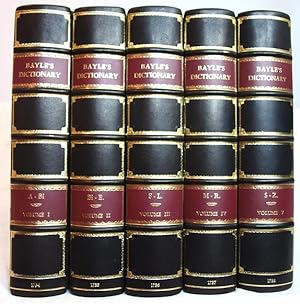Beschreibung
Folio. 5 Volumes. Vol. 1: [10], 17, [1], cxxviii, 803, [1] p.; v. 2: [2], 880 p.; v. 3: [2], 973, [1] p.; v. 4: [2], 944 p.; v. 5: [2], 872, 143, [1] p. Includes index. Bound in fine modern brown leather. Gilt spine and boards. Maroon leather spine labels. 5 raised bands. Marbled endpages. New endpapers. Fine binding and covers. Small owners stamp to bottom of original FFEP. Dampstain affecting title pages and first few pages margins, affecting text to Vol. I-III and V. Per Printing in the Mind of Man 155b: "For over half a century, until the publication of the Encyclopedie, Bayle's Dictionnaire dominated enlightened thinking in every part of Europe". Pierre Bayle's Dictionary is effectively constituted one of the first encyclopaedias of ideas and their originators. In the Dictionary, Bayle expressed his view that much that was considered to be "truth" was actually just opinion, and that gullibility and stubbornness were prevalent. The Dictionary remains an important scholarly work for several generations after its publication. The majority of the entries are devoted to individual people, whether historical or mythical, though some articles treat religious beliefs and philosophies. Many of the more controversial ideas in the book were hidden away in the voluminous footnotes, or slipped into articles on seemingly uncontroversial topics. Pierre Bayle was a Huguenot scholar who fled from French religious intolerance to Geneva and Holland. Bayle's influential encyclopedia was a best-selling philosophical work of the 18th century. The Dictionnaire's influence can be seen on Diderot, Locke, Leibniz, Kant, Hume, Berkeley, among others. The work combined biography, history, literary criticism, theology, obscenity, in addition to philosophical treatments of toleration, the problem of evil, epistemological questions, etc. Bayle's extensive commentary propelled his reader's interest. (Although an avowed Christian by faith rather than by reason, Bayle's fideist approach to the question of God created the logical framework for an atheist worldview. Bayle pointed out contradictions between theological tenets and the supposedly self-evident dictates of reason, though at the same time sought to promote religious tolerance, and argued strongly against inflexible and authoritarian application of religious articles of faith. (The SEP remarks that Bayle's most significant impact is on the impulse towards modern atheism.) (Standford Encyclopedia of Philosophy) Bayle's remarks on Spinoza are particularly interesting. This is an oversized or heavy book that requires additional postage for international delivery outside of Canada and the US. Bestandsnummer des Verkäufers 1503260060
Verkäufer kontaktieren
Diesen Artikel melden
![]()



